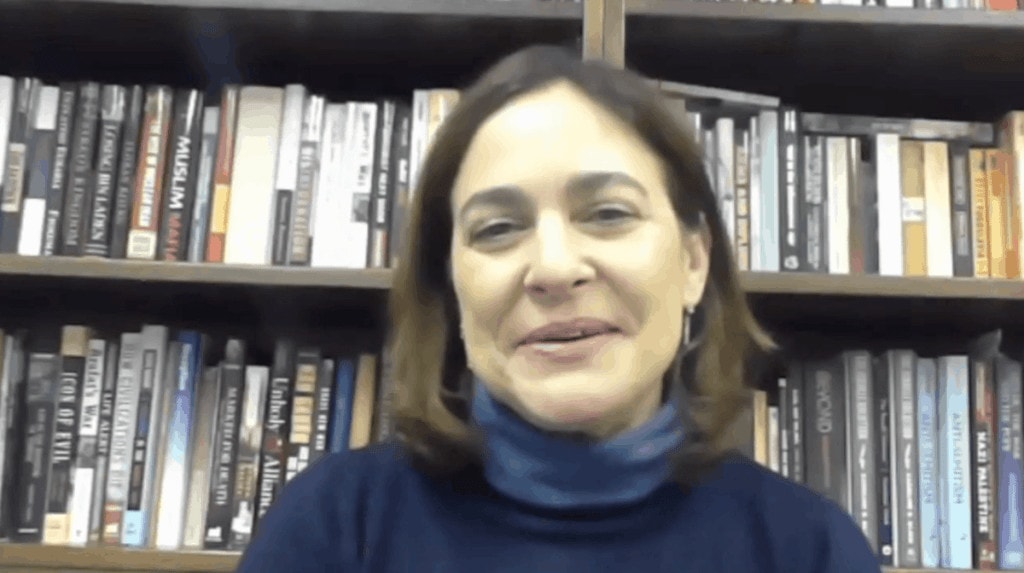Glick and Wurmser discuss how Israel is confronting coronavirus during a political crisis
On March 24, 2019, Center for Security Policy President Fred Fleitz moderated a virtual panel discussion with two outstanding experts: Senior Analyst David Wurmser, who also is director of the Center’s Project on Global Anti-Semitism and the U.S.-Israel Relationship and Center Senior Fellow Caroline Glick. Glick participated in this virtual panel from Israel.

While the Israeli government took a very aggressive response to stem the flow of coronavirus in the country — perhaps the first to take tough steps in the West – Israel is facing a political crisis in forming a new government which the Speaker of the Knesset is defying an order from the Israeli Supreme Court to allow lawmakers to vote on a new Prime Minister.
On March 24, 2019, Center for Security Policy President Fred Fleitz moderated a virtual panel discussion with two outstanding experts: Senior Analyst David Wurmser, who also is director of the Center’s Project on Global Anti-Semitism and the U.S.-Israel Relationship and Center Senior Fellow Caroline Glick. Glick participated in this virtual panel from Israel.
Caroline Glick, an Israeli journalist who served in the Israeli military and ran for a seat in the Knesset, said Israel is all but in full lockdown mode right now, with businesses closed and internal travel severely reduced. She noted that the government very early on banned flights from China, and again very early on then banned flights from other countries, while placing all remaining arriving travelers for hot areas in quarantine.
Glick noted that The Israeli government has taken a publicly dire tone, at one point even warning that Israel may in the end suffer one million cases with thousands dead. Israel currently has over 1,800 cases, with a little over 30 in critical condition. Three Israelis have died thus far. The curve for both is still in sharp acceleration in Israel, so there is no sign yet of a leveling off.
Wurmser said in the long term, it is likely that Israel’s economy will emerge from this crisis in a strong situation. The decisive actions by the current caretaker government in Israel under Prime Minister Netanyahu took early on could limit the magnitude of the outbreak and might end it faster relative to other countries. Moreover, Israel’s economy is agile and innovative, and is well positioned to benefit from the highly dynamic post-crisis global economy.
Glick and Wurmser discussed at length the complicated political situation in Israel and the continuing failure to form a government after three inconclusive elections. According to Glick, :we are in the midst of multiple crises concerning our politics.
Head of center-left block Benny Gantz allied with very anti-Israel, anti-Zionist, pro-terrorist joint Arab List that openly supports Iran, Hezbollah, Hamas in trying to oust Prime Minister Netanyahu. She said Gantz is making deals with and offering positions to the Arab List. Glick said it was unprecedented in Israeli politics for a major political party to strike an alliance with irredentist elements hostile to the Israeli state. Glick also discussed how the Center-Left bloc has moved to use legislation and the Israeli courts to bar Netanyahu from becoming Prime Minister again and to force a vote on the new prime minister to their advantage.
According to David Wurmser, With the removal by the Supreme Court of current caretaker Knesset speaker Yuli Edlestein now all but certain, the Knesset will likely in the coming days proceed to pass the legislation disqualifying Prime Minister Netanyahu from being able to form a government, thus removing any alternative to Gantz’ forming one. Moreover, since Gantz will still be unlikely able to form a government, and thus a fourth round of elections is quite possible, it would remove Gantz’ chief political opponent from being able to run for office, paralyzing the Likud party.
Wurmser and Glick agreed that while Gantz’s coalition may continue to prevent Netanyahu from forming a new government and could force a fourth round of elections, polls suggest that the current caretaker government under Prime Minister Netanyahu is handling the current Corona crisis well and with great popular approval. They also noted that Gantz has suffered politically during this struggle for power due to his inability to form a government and his alliance with the Arab List. Wurmser noted, moreover, that the trend line for Gantz and his party is downward and that Likud and Netanyahu gained seats in the last election round.
Gick outlined a more pessimistic scenario, but one which may be more realistic. Gantz will indeed be unable to form a government but may succeed in passing legislation to bar Netanyahu from being the Likud party’s candidate in the next election. This would be a devastating blow to the 50% of the country who would see this a fundamental assault on the democratic choice.
Glick and Wurmser agreed that severe damage has already been done by the supreme court. By so heavy-handedly interfering without even answering the arguments put forward by the Knesset’s chief legal advisor, the court has involved itself in political rather than legal question and overstepped the lines between the judicial and legislative branches of government. The long-term damage to the integrity of the court will make judicial activism and the politicization of the courts an even greater hot-button issue in Israel. This probably ensures that it will take considerable time and effort to reverse the erosion of and reestablish the independence and credibility of the Israeli courts.
- Dr. David Wurmser reacts to the Israeli Government’s attempt to safeguard archaeological sites - February 17, 2026
- Dr. David Wurmser Reviews Developments in Israel on this International Holocaust Remembrance Day - January 29, 2026
- Middle East Expert Unpacks What’s Next for Iran as US Military Assets Approach - January 27, 2026
